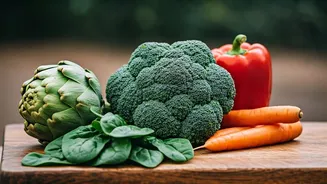Understanding Fatty Liver
Fatty liver disease, characterized by excessive fat accumulation in the liver, is a growing concern. It can stem from various factors, including obesity,
poor diet, and excessive alcohol consumption. This condition can progress from simple fat accumulation to more severe stages like inflammation (steatohepatitis), fibrosis, cirrhosis, and even liver failure. It’s crucial to manage this condition by addressing the underlying causes and incorporating lifestyle changes. Dietary adjustments play a vital role in mitigating the impacts of fatty liver disease and promoting liver health. Embracing nutrient-rich foods, such as specific vegetables, can be a beneficial part of the healing process, helping to reduce inflammation, improve liver function, and possibly reverse some of the damage.
Leafy Green Powerhouse
Leafy green vegetables are incredibly beneficial. Spinach, kale, and other dark green leafy greens are packed with antioxidants and nutrients. These components help protect the liver from damage. They contain compounds that support detoxification pathways, helping the liver eliminate harmful substances. Additionally, leafy greens are rich in fiber, which promotes healthy digestion and reduces the build-up of fat in the liver. Try incorporating spinach into smoothies, salads, or stir-fries. Kale can be steamed, baked, or added to soups. Regularly consuming these greens will enhance your liver's ability to function effectively and reduce the severity of fatty liver symptoms.
Cruciferous Vegetable Champions
Cruciferous vegetables, such as broccoli, cauliflower, and Brussels sprouts, are excellent choices for liver health. These vegetables contain glucosinolates, compounds that support the liver's detoxification process. Glucosinolates help the liver produce enzymes that eliminate toxins. They also reduce inflammation and oxidative stress, both major contributors to liver damage. Broccoli can be eaten raw, steamed, roasted, or added to various dishes. Cauliflower can be used as a rice substitute or roasted. Brussels sprouts can be roasted or sautéed. Consuming these vegetables regularly can improve liver function and reduce the accumulation of fat. They have been shown to improve liver enzyme levels, indicating better liver health.
Beets for Liver Support
Beets are another fantastic option. They contain betaine, an amino acid with antioxidant and anti-inflammatory properties. Betaine helps protect the liver from oxidative stress and reduces inflammation. They support the liver's detoxification pathways, helping to eliminate harmful substances. Beets also help improve bile flow, aiding in the removal of toxins. They can be eaten raw in salads, juiced, roasted, or boiled. Including beets in your diet can help protect your liver from further damage and improve its overall health. They also help reduce inflammation. The vibrant color of beets is a testament to their rich antioxidant content, making them a great addition to a liver-friendly diet.
Garlic for Protection
Garlic, a common culinary ingredient, is incredibly beneficial for liver health. It contains allicin, a compound with antioxidant and anti-inflammatory properties. Garlic helps reduce liver fat accumulation and protects the liver from damage. It supports detoxification by activating liver enzymes that remove toxins. Regularly consuming garlic can improve liver enzyme levels and reduce the risk of fatty liver disease. Garlic can be added to various dishes, from stir-fries to soups, or even consumed raw. Its potent compounds provide remarkable health benefits. Garlic's ability to improve liver health makes it a valuable addition to any diet designed to support liver function and overall well-being.
Carrots: Antioxidant Boost
Carrots are also helpful for liver health. They are rich in beta-carotene, a powerful antioxidant that the body converts to vitamin A. Antioxidants protect liver cells from damage caused by free radicals. Carrots help reduce inflammation and oxidative stress, crucial factors in fatty liver disease. They also support the liver's natural detoxification processes. Carrots can be eaten raw, juiced, or cooked in various ways. Adding them to salads, stir-fries, or soups is an easy way to incorporate their benefits into your diet. The combination of beta-carotene and other nutrients makes carrots a valuable addition to a liver-healthy diet, promoting improved liver function and overall well-being.
















